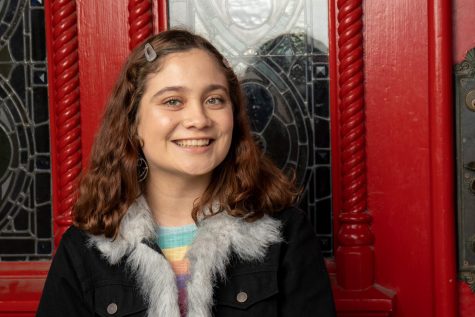Mary Moody Northen production of ‘Marisol’ wows audience with magical realism
Abigail Cortinas (left) as Marisol and Sierra Sterling as her guardian Angel. “You know, after Marisol has her interaction with the angel, she clearly says, “A beautiful black angel!” [Jose Rivera] could’ve not said that; he could’ve [just] said a beautiful angel,” Sterling says.
Walking into the Mary Moody Northen Theater (MMNT) on Nov. 15 was like walking into the most organized chaos. There’s was a city in the middle of the stage, but it was also a bed. Red fabric hung from the ceiling and a crown-like object stood at the center of the room. Sand fell from the ceiling and lights turned into fire. The set design by Hailey J. Strader for the MMNT’s production of “Marisol” transported audiences to a whole new world that was both relatable and completely new at the same time.
In the play, a dream turns into a nightmare when everyone’s favorite girl, Marisol, is visited by an angel. This urban nightmare grows increasingly bleak as the world starts to mirror the world we live in today, except for one vital detail: The moon is missing. And Marisol’s God is cenile and dying, which leads him to some severe decisions. How will Marisol navigate this apocalyptic world that seems to change every time she blinks?
“We wanted to give the students a chance to explore what’s called magical realism. It’s a style of drama that is very popular with this specific playwright, Jose Rivera. And this is very prolific and this is his best play,” said Robert Tolaro, MMNT’s artistic director.
Apples are extinct in the play. Angels are at war with God. The apocalypse is happening in Le Bronx and there’s nothing anyone can do but simply go through it. “Marisol” calls its audience to action.
All of us have a bit of Marisol in us and if you feel like you don’t, you know a Marisol that could benefit from some comfort and guidance. This cautionary tale watches Marisol make her journey through different violent situations and encourages the rest of the cast — and even the audience — to maintain hope for the future and to fight for it.
There’s a lot to think about and question in this play. And if the plot isn’t interesting enough, which I highly doubt, consider the social and political importance it holds.
“I think it’s really relevant to have a story like this,” said Sophia Utria, who plays Marisol’s shadow self. “So often when people think of theatre, they think white guys doing Shakespeare in London. And this is so far removed from that. It is a young woman of color leading it. She’s the first thing you see. And race is acknowledged in the play in a really beautiful way.”
Utria’s right. Diversity is key to creativity. It’s time that brown and black people see people who look like them on stage. Many playwrights shy away from race and maintain a sense of vagueness so that non-POC audience members aren’t led astray, but this isn’t the case with Rivera.
“Race is constant and the playwright doesn’t shy away from race because the playwright is constantly bringing it up,” Sierra Sterling said. Sterling plays Angel in the production. ”After Marisol has her interaction with the angel, she clearly says, ‘A beautiful black angel!’ He could’ve not said that; he could’ve said a beautiful angel. The fact that he cares that it’s a black woman, and a black woman being an angel in today’s climate, is very important,” she said. “And a Latinx woman leading a play in this climate, where she gets to speak Spanish and where her culture is very present. I think showing that to the St. Edward’s community is just incredible,” she added.
“Marisol” features themes of climate change, Nazis, estranged family members, homelessness, selfishness, the want to be good and everything in-between.
John Winkler, a communication student in the audience, said it best: “Marisol is a dark and frightening reflection of modern society. The frenetic action on stage will keep you engaged as the ominous dialog picks at your mind, reminding you that despite this being a fictional play, its commentary is relevant to issues we continually struggle with in real life.”

Hey ya'll! My name is Sammy Jo Cienfuegos and I'm one of the two Viewpoints editors. I'm a senior Writing and Rhetoric major, with an emphasis in Creative...


![Abigail Cortinas (left) as Marisol and Sierra Sterling as her guardian Angel. "You know, after Marisol has her interaction with the angel, she clearly says, “A beautiful black angel!” [Jose Rivera] could’ve not said that; he could’ve [just] said a beautiful angel," Sterling says.](https://www.hilltopviewsonline.com/wp-content/uploads/2019/11/IMG_6782-900x600.jpg)




